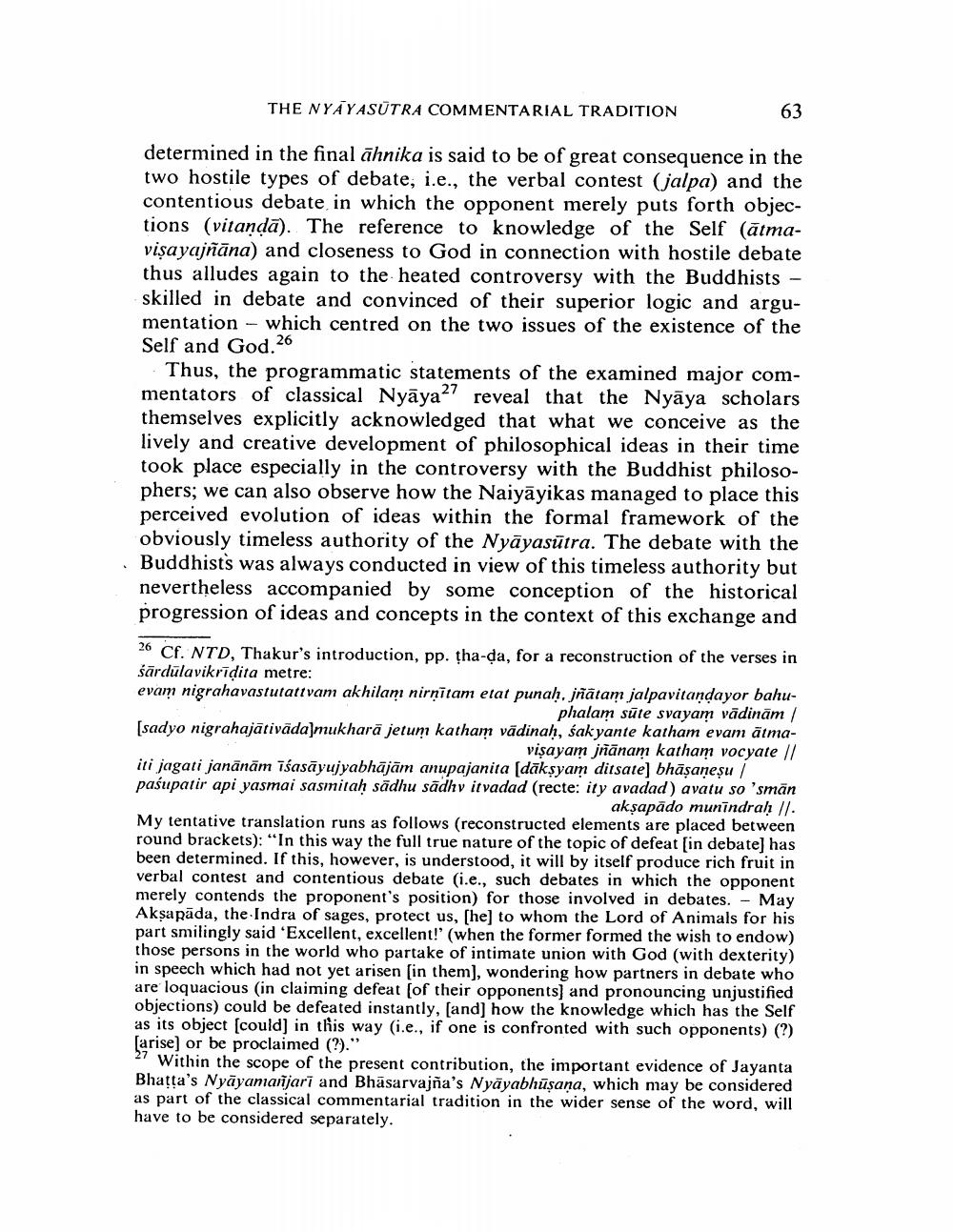________________
THE NYAYASŪTRA COMMENTARIAL TRADITION
63
determined in the final āhnika is said to be of great consequence in the two hostile types of debate, i.e., the verbal contest (jalpa) and the contentious debate in which the opponent merely puts forth objections (vitandā). The reference to knowledge of the Self (ātmavişayajñāna) and closeness to God in connection with hostile debate thus alludes again to the heated controversy with the Buddhists - skilled in debate and convinced of their superior logic and argumentation - which centred on the two issues of the existence of the Self and God. 26
Thus, the programmatic statements of the examined major commentators of classical Nyāya27 reveal that the Nyāya scholars themselves explicitly acknowledged that what we conceive as the lively and creative development of philosophical ideas in their time took place especially in the controversy with the Buddhist philosophers; we can also observe how the Naiyāyikas managed to place this perceived evolution of ideas within the formal framework of the obviously timeless authority of the Nyāyasūtra. The debate with the Buddhists was always conducted in view of this timeless authority but nevertheless accompanied by some conception of the historical progression of ideas and concepts in the context of this exchange and
26 Cf. NTD, Thakur's introduction, pp. tha-da, for a reconstruction of the verses in śārdūlavikridita metre: evam nigrahavastutattvam akhilam nirnītam etat punah. jñātam jalpavitandayor bahu
phalam sūte svayam vādinām [sadyo nigrahajātivāda]mukharā jetum katham vādinah, sak yante katham evam ātma
visayam jrānam katham vocyate // iti jagati janānām iśasāyujyabhājām anupajanita (dākṣyam ditsate] bhāṣaneșu / paśupatir api yasmai sasmitaḥ sādhu sādhv itvadad (recte: ity avadad) avatu so 'sman
akşapădo munindrah //. My tentative translation runs as follows (reconstructed elements are placed between round brackets): “In this way the full true nature of the topic of defeat (in debate) has been determined. If this, however, is understood, it will by itself produce rich fruit in verbal contest and contentious debate (i.e., such debates in which the opponent merely contends the proponent's position) for those involved in debates. - May Aksapāda, the-Indra of sages, protect us, [he] to whom the Lord of Animals for his part smilingly said 'Excellent, excellent!' (when the former formed the wish to endow) those persons in the world who partake of intimate union with God (with dexterity) in speech which had not yet arisen (in them), wondering how partners in debate who are loquacious (in claiming defeat of their opponents and pronouncing unjustified objections) could be defeated instantly, [and] how the knowledge which has the Self as its object (could) in this way (i.e., if one is confronted with such opponents) (?) (arise) or be proclaimed (?)." 27 Within the scope of the present contribution, the important evidence of Jayanta Bhatta's Nyāyamarījarī and Bhāsarvajña's Nyāyabhūşaņa, which may be considered as part of the classical commentarial tradition in the wider sense of the word, will have to be considered separately.




